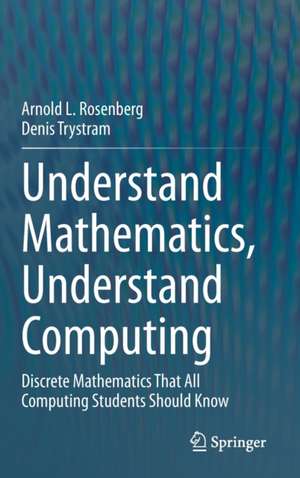Understand Mathematics, Understand Computing: Discrete Mathematics That All Computing Students Should Know
Autor Arnold L. Rosenberg, Denis Trystramen Limba Engleză Hardback – 6 dec 2020
By means of lessons and exercises on “doing” mathematics, the book prepares interested readers to develop new concepts and invent new techniques and technologies that will enhance all aspects of computing. The book will be of value to students, scientists, and engineers engaged in the design and use of computing systems, and to scholars and practitioners beyond these technical fields who want to learn and apply novel computational ideas.
| Toate formatele și edițiile | Preț | Express |
|---|---|---|
| Paperback (1) | 396.56 lei 6-8 săpt. | |
| Springer International Publishing – 7 dec 2021 | 396.56 lei 6-8 săpt. | |
| Hardback (1) | 508.39 lei 3-5 săpt. | +40.94 lei 7-13 zile |
| Springer International Publishing – 6 dec 2020 | 508.39 lei 3-5 săpt. | +40.94 lei 7-13 zile |
Preț: 508.39 lei
Preț vechi: 635.48 lei
-20% Nou
Puncte Express: 763
Preț estimativ în valută:
97.34€ • 101.36$ • 80.76£
97.34€ • 101.36$ • 80.76£
Carte disponibilă
Livrare economică 23 ianuarie-06 februarie
Livrare express 09-15 ianuarie pentru 50.93 lei
Preluare comenzi: 021 569.72.76
Specificații
ISBN-13: 9783030583750
ISBN-10: 3030583759
Pagini: 550
Ilustrații: XXVII, 550 p. 151 illus., 2 illus. in color.
Dimensiuni: 155 x 235 x 40 mm
Greutate: 0.98 kg
Ediția:1st ed. 2020
Editura: Springer International Publishing
Colecția Springer
Locul publicării:Cham, Switzerland
ISBN-10: 3030583759
Pagini: 550
Ilustrații: XXVII, 550 p. 151 illus., 2 illus. in color.
Dimensiuni: 155 x 235 x 40 mm
Greutate: 0.98 kg
Ediția:1st ed. 2020
Editura: Springer International Publishing
Colecția Springer
Locul publicării:Cham, Switzerland
Cuprins
Introduction.- “Doing” Mathematics: A Toolkit for Mathematical Reasoning.- Sets and Their Algebras: The Stem Cells of Mathematics.- Numbers I: The Basics of Our Number System.- Arithmetic: Putting Numbers to Work.- Summations: Complex Operations from Simple Components.- The Vertigo of Infinity: Handling the Very Large and the Infinite.- Numbers II: Building the Integers and Building with the Integers.- Recurrences: Rendering Complex Structure Manageable.- Numbers III: Operational Representations and Their Consequences.- The Art of Counting: Combinatorics, Probability, and Statistics.- Graphs I: Representing Relationships Mathematically.- Graphs II: Graphs Within Computation and Communication.- Solutions to Exercises.- App. A, Pairing Functions.- App. B, A Deeper Look at the Fibonacci Numbers.- App. C, Two Recurrence-Defined Number Families.- App. D, Signed-Digit Numerals: Carry-Free Addition.- App. E, The Diverse Delights of de Bruijn Networks.- List of Symbols.- References.- Index.
Recenzii
“The text is written in an easy to read format which generously incorporates narratives from the history of mathematics as well as rigorous proofs of the concepts presented. The appendices and references to other texts provide the reader with numerous sources of supplementary information for those wishing to delve into a subject at a deeper level … . chapters are organized and clearly labeled to express which sections are appropriate for a beginning learner, an intermediate learner, or the specialist.” (Tom French, MAA Reviews, October 3, 2021)
Notă biografică
Prof. Arnold Rosenberg is a distinguished university professor emeritus at the University of Massachusetts, Amherst. He also held research positions at Northeastern University and Colorado State University, a professorship at Duke University, and a staff research position at IBM Watson Research Center. He was elected a fellow of the ACM in 1996 for his work on graph-theoretic models of compuation, emphasizing theoretical studies of parallel algorithms and architectures, VLSI design and layout, and data structures. In 1997, he was elected as a fellow of the IEEE for fundamental contributions to theoretical aspects of computer science and engineering.
Prof. Denis Trystram is a distinguished professor at the Grenoble Institute of Engineering, an honorary member of the Institut Universitaire de France (IUF), and he works at the Laboratoire d'Informatique de Grenoble (LIG) in the team-project DataMove-INRIA. His research interestst include the design and analysis of efficient algorithms for optimizing resource use in parallel and distributed systems, approximation algorithms for scheduling and packing problems, and algorithms for data analytics. Both authors have considerable teaching and practical experience in the application of discrete mathematics approaches to computing tasks.
Prof. Denis Trystram is a distinguished professor at the Grenoble Institute of Engineering, an honorary member of the Institut Universitaire de France (IUF), and he works at the Laboratoire d'Informatique de Grenoble (LIG) in the team-project DataMove-INRIA. His research interestst include the design and analysis of efficient algorithms for optimizing resource use in parallel and distributed systems, approximation algorithms for scheduling and packing problems, and algorithms for data analytics. Both authors have considerable teaching and practical experience in the application of discrete mathematics approaches to computing tasks.
Textul de pe ultima copertă
In this book the authors aim to endow the reader with an operational, conceptual, and methodological understanding of the discrete mathematics that can be used to study, understand, and perform computing. They want the reader to understand the elements of computing, rather than just know them. The basic topics are presented in a way that encourages readers to develop their personal way of thinking about mathematics. Many topics are developed at several levels, in a single voice, with sample applications from within the world of computing. Extensive historical and cultural asides emphasize the human side of mathematics and mathematicians.
By means of lessons and exercises on “doing” mathematics, the book prepares interested readers to develop new concepts and invent new techniques and technologies that will enhance all aspects of computing. The book will be of value to students, scientists, and engineers engaged in the design and use of computing systems, and to scholars and practitioners beyond these technical fields who want to learn and apply novel computational ideas.
Caracteristici
Endows the reader with an operational conceptual and methodological understanding of discrete mathematics for computing Suitable for advanced undergraduate and graduate students, and self-study by researchers and professionals Authors' ambition is that the reader will truly understand the elements of computing rather than just know them
